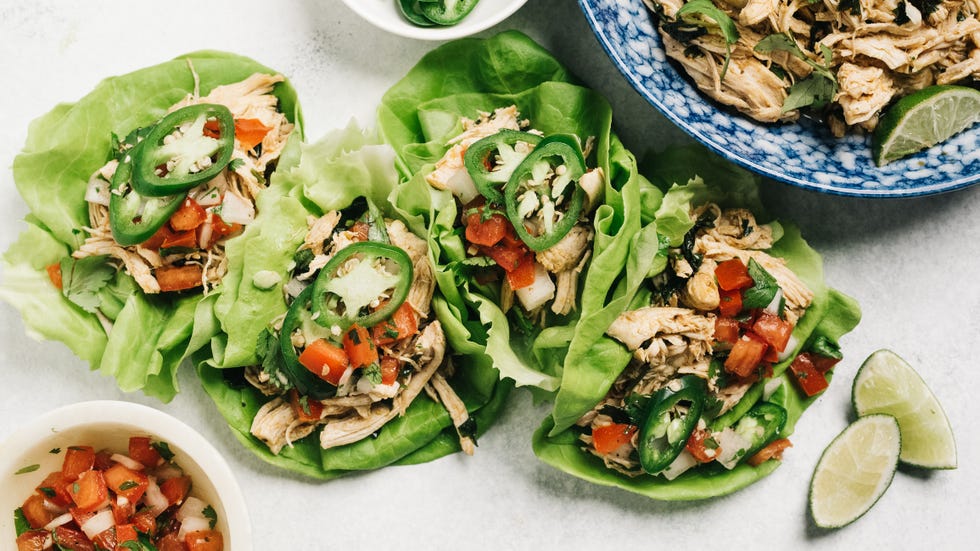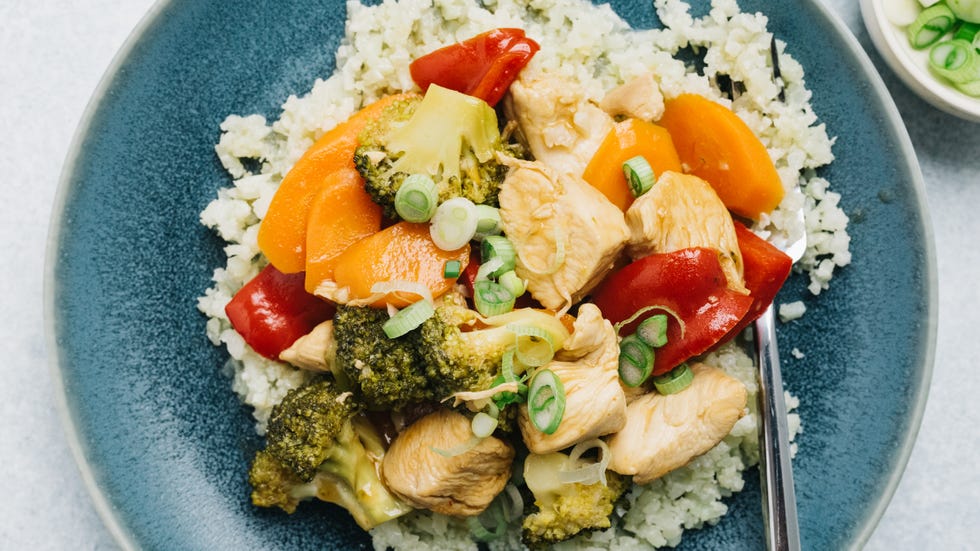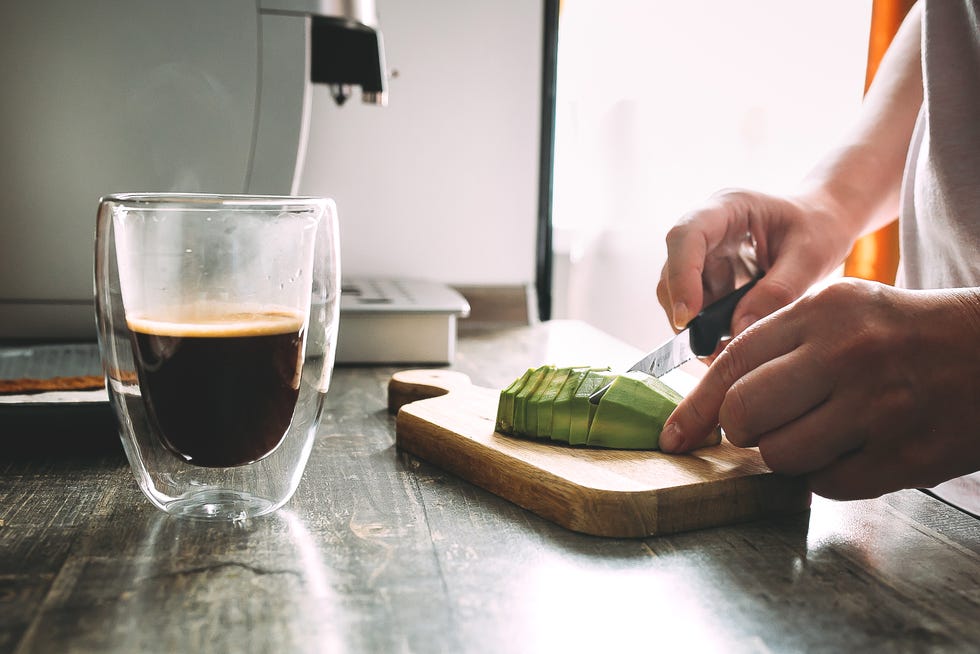IF YOU SPEND any amount of time on the internet, you’ve probably heard a thing or two about Whole30. This modern diet has developed a devoted internet following. The official Instagram account boasting almost a million followers, flooding feeds with nearly 4.5 million posts with the hashtag #Whole30.
The diet, designed to eliminate inflammatory foods and “reset” your relationship with food, was created by Melissa Urban and her then-husband in 2009. Whole30 is an elimination diet that asks you to rid your eating of several food categories including sugar, grains, dairy, and processed foods. The idea is designed to allow you to evaluate how your body feels when eating whole, unprocessed foods compared to your normal diet.
“By eliminating [these foods] for a month, followers often experience improved digestion, better sleep, increased energy, and some experience weight loss,” says Avery Zenker, R.D.
Sounds promising, right? Unfortunately, the methods behind this diet have very little expert and scientific backing. The creator is a personal trainer and nutrition coach, but not a registered dietician or medical doctor. There’s been little to no scientific research done on this diet to prove its claims. In fact, less restrictive diets have been shown to have greater success in regards to weight loss. Whole30 didn’t even make it onto the U.S. News and World Report’s 2023 Diet Rankings.
Yet, almost 15 years after its creation, followers still rave about this plan. There’s something about Whole30 that keeps these people talking, despite the evidence to the contrary. Before you embark on your own Whole30 journey, here’s what you need to know about the diet and its supposed benefits.
What Is the Whole30 Diet?
Urban explains that Whole30 is designed as an elimination diet to help people identify food sensitivities, which is why so many things are restricted. You basically eliminate the “banned foods” for 30 days and carefully add them back in, she says.
“I think people misunderstand the program,” Urban explains. “It’s a self experiment after which there is an entire outlined plan to take what you’ve learned and to make it into a sustainable lifestyle.”
People might try an elimination diet if they frequently experience gas, bloating, digestion problems, or even skin rashes, and suspect a food allergy or intolerance.
However, Alyssa Ardolino, R.D. at the International Food Information Council, only recommends elimination diets for people with major gastrointestinal problems. Even then, she believes drastic measures aren’t necessary.
“Typically people who have GI issues notice which foods kind of bother them,” she tells Men’s Health. “Sometimes you can kind of just eliminate that one food instead of going so drastic.”
Whether you do a full-on elimination diet or not, it’s best to develop an individualized approach with a doctor to determine if food could be causing health concerns, Ardolino explains. Doing an elimination diet on your own, without proper medical guidance and protocol, likely won’t give you the answers you’re looking for.

Cavan Images//Getty Images
What Can I Eat on the Whole30 Diet?
This plan is not for the faint of heart. Meat, seafood, eggs, vegetables, natural fats (seeds, avocado and olive oil), and fruit are allowed on the Whole30 diet.
But there’s a long list of foods that are off-limits during the diet:
Added, real and artificial sugars: this means no maple syrup, agave, honey, coconut sugar, stevia or date syrup
Alcohol: not even when cooking
Grains: including wheat, oats, corn, quinoa and buckwheat
Legumes: all beans, peas, chickpeas, lentils and peanuts are out. Yes, this means no peanut butter.
Soy: soy sauce, miso, tofu, tempeh, edamame are omitted
Dairy: cow, goat, or sheep’s milk products
Carrageenan, MSG, or sulfites
Baked goods, junk foods, or treats with “approved” Whole30 ingredients: recreating a cookie with Whole30 approved ingredients is not OK.
There’s also an entire list of additives that aren’t allowed, which can be found on the Whole30 website.
So what can you eat? There are certain exceptions to the no dairy and soy rule. For example, clarified butter and coconut aminos are permitted.
Lists of banned and approved Whole30 foods can be found on their website.
What Are the Benefits of Whole30?
Whole30 doesn’t promise to fix all your health woes, but they do offer a very long list of benefits that dieters have experienced, which include:
Fewer blemishesThicker hairLess bloatingLess constipation, gas, and bloatingFewer cravingsImproved relationship with foodBetter sleepMore energy
“We’ve got legitimately hundreds of thousands of testimonials,” Urban says. “We hear from people who report improvement of allergies and migraines and cravings.”
Of course, testimonials don’t count as legitimate science. “Anecdotal evidence and testimonials do not count as evidence as they are subjective information, are not scientific, and have the potential for bias,” explains Lisa Young, Ph.D., R.D.N. a private practice dietitian, adjunct professor at New York University, and author of Finally Full, Finally Slim. Young warns that testimonials only tell positive experiences, whereas negative experience tend not to get reported or publicized.
Ardolino also warns that there’s no telling whether the positive effects reported in these testimonials were due to food or something else. “Our health is not only based on what we eat. It’s also based on how stressed we are [and] how much sleep we’re getting,” she says.
Ardolino says there is one positive aspect of the Whole30: its emphasis on whole foods over processed products.
Still, the complete elimination of processed foods is unsustainable and unnecessary. “ I advocate for eating well most of the time, leaving some room for ‘less than perfect’ foods,” Young says. “This is a more sustainable way to live.”

Cavan Images//Getty Images
What Are Some Disadvantages of Doing Whole30?
According to Zenker, this diet may not be suitable for individuals with certain medical conditions, such as diabetes or kidney disease.
Your individual preferences and goals may make Whole30 a bad fit for you, too. If you’re a vegan or vegetarian, you’ll definitely want to make sure you get enough of certain nutrients on this diet. As always, the best plan of action is to consult with a healthcare professional before trying something like Whole30 to ensure all your nutrition needs will be met.
Accessibility is also possible barrier. “Whole30 encourages a diet of whole, fresh foods. While these are definitely nutritious, they’re not the most shelf-stable, and often not as accessible as some foods that are more processed,” Zenker says.
It’s not easy to find Whole30 options at fast food restaurants, gas stations, and convenience stores, which are more widely available than organic, whole foods centered grocery stores. That may drive up the price, too—fresh foods are typically more expensive than its more accessible, non-perishable counterparts.
Lastly, the 30-day duration of this diet won’t be helpful for most. “There are both benefits and drawbacks to the 30-day timeline of this diet. While 30 days of eating healthy is a great start, a healthy lifestyle continues onward,” says Zenker. “This diet likely isn’t for individuals seeking a one-and-done diet.”
Does Whole30 Help With Weight Loss?
Before getting into this, it’s important to stress that the Whole30 doesn’t market itself as a weight loss diet. In fact, one of the rules is that you can only weigh yourself the first and last day of the diet. That said, many people do claim to lose weight after following the plan.
“If you really truly improve your health in a sustainable fashion, natural sustainable weight loss does follow,” Urban says.
Cutting out processed foods—especially refined sugars—is the tenant of nearly all doctor-approved diets. According to research from the Harvard T.H. Chan School of Public Health published in the New England Journal of Medicine, consuming high-quality foods—vegetables, whole grains, fruits, nuts, and natural yogurt—is good for your waistline, while eating processed, sugar-loaded foods tend to be one of the main factors contributing to weight gain.
But following the Whole30 doesn’t mean you’ll magically shed pounds as you can still overdo it on caloric foods like avocados, nuts and dried fruit.

Alexandr Kolesnikov//Getty Images
Is Whole30 Healthy?
According to Urban, one of the best things about Whole30 is that it forces you to cook.
“They’re getting into the kitchen and buying real, whole food, and they’re cooking,” she says of Whole30 followers. “That’s the single most important thing that people can do if they want to start eating healthier.”
Urban isn’t off base. Studies show that restaurant meals contain way more calories than a person needs in a single meal. Research published in April 2016 showed that the average restaurant dish has about 1,200 calories.
Unfortunately, it’s impossible to say for sure what the health benefits and risks of Whole30 are, since there are no peer-reviewed scientific studies that look at its short-term or long-term effects.
While Ardolino says Whole30 emphasizes nutritious foods like fruits, vegetables and healthy fats, she doesn’t like that it restricts food groups. Plus, the dietitian believes that thinking of food as good and bad can foster negative feelings in people who have disordered eating habits.
“If somebody then caves and eats one of these foods that are off limits, that feeling of shame and guilt comes in,” she says.
For people trying improve their health, Ardolino recommends something drastic: avoiding the scale.
“I really believe that in order for somebody to improve their health they have to be able to set the goal of weight loss aside,” she asserts.
Instead, building good habits should always be your primary goal. Start by adding just one more serving of fruits and vegetables into your day. Go for a walk, or increase your gym visits from two to three times a week.
She also advises being mindful about whether or not you’re truly hungry before eating. “Take a second and say, ‘Am I trying to solve an issue by eating this food?’” she says.


Melissa Matthews
Health Writer
Melissa Matthews is the Health Writer at Men’s Health, covering the latest in food, nutrition, and health.
Christine Byrne, MPH, RD, LDN, is a registered dietitian and the owner of Christine Byrne Nutrition, a private practice serving clients in Raleigh, NC, and virtually across the country. She specializes in eating disorders and disordered eating, and takes a weight-inclusive approach to health. A longtime journalist, she has worked as a food editor at BuzzFeed and Self, and her writing has appeared in dozens of national media outlets, including Outside, HuffPost, EatingWell, Food Network, Glamour, Bon Appetit, Health, and more.
Perri is a New York City-born and -based writer; she holds a bachelor’s in psychology from Columbia University and is also a culinary school graduate of the plant-based Natural Gourmet Institute, which is now the Natural Gourmet Center at the Institute of Culinary Education. Her work has appeared in the New York Post, Men’s Journal, Rolling Stone, Oprah Daily, Insider.com, Architectural Digest, Southern Living, and more. She’s probably seen Dave Matthews Band in your hometown, and she’ll never turn down a bloody mary. Learn more at VeganWhenSober.com.
>>> Read full article>>>
Copyright for syndicated content belongs to the linked Source : Men’s Health – https://www.menshealth.com/weight-loss/a19542022/whole-30-diet-for-weight-loss/










